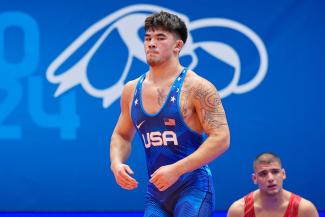RIO 2016 Champion Erica Wiebe Stays Committed to Olympic Dream
Wednesday, June 14, 2017 - 07:45 By United World Wrestling Press

“No other sport like it” for committed Olympic champ Erica Wiebe
Luke Norman, Special to United World Wrestling
In the 10 months since winning gold at the Rio 2016 Olympic Games, Canada’s Erica Wiebe has been mobbed “like The Beatles”, courted by the powerful world of WWE and challenged to endless eating competitions by her coach. But nothing has dimmed her focus on Tokyo 2020.
“I took some time, took a lot of the opportunities that were afforded me after I was successful in Rio. Now I am back. It is a huge challenge to do it again in Tokyo, but that is the goal,” said the Olympic 75kg champion.
“I really love wrestling.”
In early 2017, this passion, allied to an always independent and open mind, saw the Canadian embrace the kind of life-enhancing opportunity that comes with Olympic success. Drafted as captain of the women’s Mumbai Maharathi team, the 27-year-old took part in the Indian Pro Wrestling League.
“It was very different. There were lights, there was smoke, there was an announcer bellowing out my name, drums. I was recognised on the street, everywhere you went the Indian fans just went crazy,” Wiebe said of the three-week, city-state tournament.
Wrestling in front of thousands of passionate fans is something the Canadian lives for, but this took it to a new level.
“After one particular match that we won, we did our media and then I had to have a guard of six security officers who were pushing all of the fans away from me as we got on the bus,” she said. “It was crazy, I felt like The Beatles.”
On and off the mat, Wiebe was way out of her habitual zone.
“The local Indians on the team, one by one begged me to go visit their families in their small villages nearby. We would drive and sit in one of their homes and drink fresh buffalo milk from the village buffalo and meet with their family. It was an experience I will never forget,” she said.
But ultimately, it is the competitor inside that still rules the 2014 Commonwealth Games champion. Despite winning all six of her bouts in India, her team were defeated in the semi-final. It is a loss that “still hurts”.
And it is this burning obsession with winning that led Wiebe to turn down the lucrative approach made by the WWE in late 2016. For one thing, she is too excited about her form on the mat to contemplate giving up Olympic competition.

“I have been successful and dominant internationally for a while,” said the woman who won 36 consecutive matches in 2014, “but I have never wrestled as well as I did on that one day in Rio. But I kind of feel like it was scratching the surface of what I am capable of.”
It has been a long but largely bump-free ride to reach such a place of confidence and serenity. Wiebe was a soccer-mad, 14-year-old schoolgirl when her eye was caught by a poster on the gymnasium door.
“It said ‘co-ed wrestling practice’. I had played soccer all my life to that point, but in that moment I was like ‘wrestling that sounds like so much fun, I’ll wear spandex and I’ll wrestle with boys’,” she laughed.
“So I went to my first practice and then instantly I was hooked on it.”
Thirteen years later, the sport continues to enthral Wiebe. And, despite all the potential distractions, this is a champion for whom her sport means everything.
“It (Wrestling) is a true display of character, perseverance, resiliency and grit. I don’t think there is another sport like it,” she said. “Wrestling had that tagline, ‘to wrestle is to be human’ and I couldn’t agree more. It is one of the purest forms of physical movement and sport we have.”


Share your thoughts.
Comments